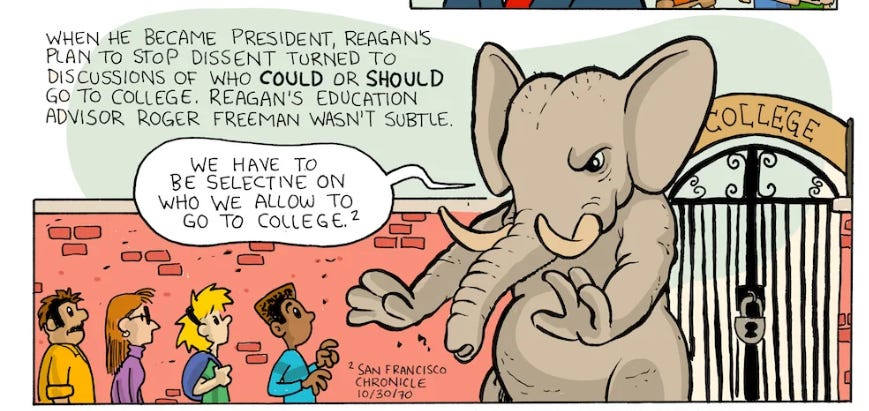People who don’t see the working class or people of color or queer people as people have launched a campaign to re-establish Jim Crow in America. They want a return to the Old Boy’s network, where only loyalists and people who can lunch in restricted country clubs get a say in how government works and even what books are allowed to be read. I’m not going to sit at home and watch Netflix while it happens. And looking at the state of things there won’t be any Black shows left after awhile. So what do you do? At the moment, we still have legislators who can take some action and we can lobby them.
Some basics.
Our government has laws that govern states and then the Nation as a whole. National laws are called federal laws and they are made by our Federal Congress.
There’s a Federal (National) Congress and a State Congress. Both will have Senators which control the Senate and Congressmen which control the House.
The Senate is always smaller than the House.
A bill which, if signed by the Governor on the state level and the President on the federal (National) level, must be approved in BOTH the House and the Senate to become a law.
Before a bill gets voted on it has to be approved for a vote in committee.
It’s a lot, I know, but a proposed law, otherwise known as a bill, can die or be voted down in committee or in the House or the Senate. How many votes you need for a bill to pass in a state Congress varies by state. Sometimes proposed laws can end up on the ballot during an election. It can get complicated. But talking to your reps doesn’t have to be.
You have a dedicated Senator and Congressman based on your address. You can google how to find out who your state reps are because state reps tend to be more accessible and people don’t chat with them as often and that means you can have more sway.
Ways to contact your Senator (Senate) or Congressman (House):
Call - There will either be a staff member who will take your comment or a voicemail box. You can have a few bullet points ready.
Email - It’s the easiest and you can do it everyday
In Person - You can ask for a meeting or join a professional organization and go with a team. Some orgs I keep in touch with are the American Library Association, Moms Demand Action, and Red, Wine and Blue among others.
There’s so much to say to our reps these days, but for me I’m focusing on book bans because I’m an author and a librarian. The chaos we’re in right now is a tactic to divide your attention so you can’t focus on any one thing, but you do have to choose. Pick one thing and laser focus on that and fight hard to get your point across.
I know that removing books and controlling information is a tactic to keep the masses ignorant and re-establish one history and one hero in America. If we can make one type of person seem the most competent and the most good and worthy, everyone else will be subjugated. We’ve been here before. After the Civil War The Daughters of the Confederacy worked tirelessly to change the narrative of the Civil War from one of greedy plantation owners from human traffickers who lost to noble men who treated their slaves like family in a “Lost Cause”. They changed textbooks and erased Black abolitionists from the record.
The data is already there to prove that the narrative about “explicit content” is just a smokescreen to remove Black history from the shelves. So I’ve got to make sure that they don’t go any further.
Out of 4,218 book titles that were banned, 1,534 – or 36% – featured people of color, the most censored identity group in book bans. Some removed titles included August Wilson’s Pulitzer-prize winning play Fences and Innosanto Nagara’s A is for Activist, a picture book for children about social issues. More
The end game is to remove libraries altogether. It’s all laid out in Project 2025. If you want an easy to understand breakdown, Seth Meyers has come together with illustrators and writers to create a comic version here:
https://stopproject2025comic.org/
Here is the email I sent to my state Senator. Feel free to copy and modify.
Senator,
There is a concentrated effort to remove books and criminalize information in this country and SB74 seeks to do just that under the guise of removing "explicit material". However, most of the books banned last year had no explicit material at all, what they did have was Black folks.
"Out of 4,218 book titles that were banned, 1,534 – or 36% – featured people of color, the most censored identity group in book bans. Some removed titles included August Wilson’s Pulitzer-prize winning play Fences and Innosanto Nagara’s A is for Activist, a picture book for children about social issues."
You can find more information here:
https://www.theguardian.com/us-news/2025/feb/27/banned-books-people-of-color-lgbtq?utm_source=dlvr.it&utm_medium=bluesky&CMP=bsky_gu
SB74 came out of committee on Tuesday. It seeks to amend the OCGA to remove the exemption for libraries and librarians to circulate material deemed “harmful to minors” (O.C.G.A. § 16-12-104). This passed out of committee on Tuesday, February 26th, with no public comment taken.
I am asking you to build a coalition to fight this and the other library bills associated with it:
SB 248 - Expand definition of materials “harmful to minors” to include 'sexually explicit material”, Create appointed Georgia Council on Library Materials; establish standards for the designation of restricted materials by local boards of education
HB 268 - school safety bill which in current version would require that school libraries be locked throughout the day other than during class change periods
HB 313 - authorize and require all public elementary and secondary schools to display the Ten Commandments, including at the school library/media center’s main entrance
HB 340 - Student personal communication device use restricted during school day K-8; amendment to phase in high school restrictions under consideration
I called earlier today, but an email response is fine.
I appreciate you,
Shanna Miles
Librarian, Author






Thank you for the template letter. As a California resident, I’ve found that when I write to my representatives, encouraging them to vote in ways that positively serve their constituents, their responses typically align with my sentiments. However, I’m curious about strategies for reaching out to politicians in other areas where progress is being hindered, stymied and blocked? Any suggestions on how to effectively engage with them?